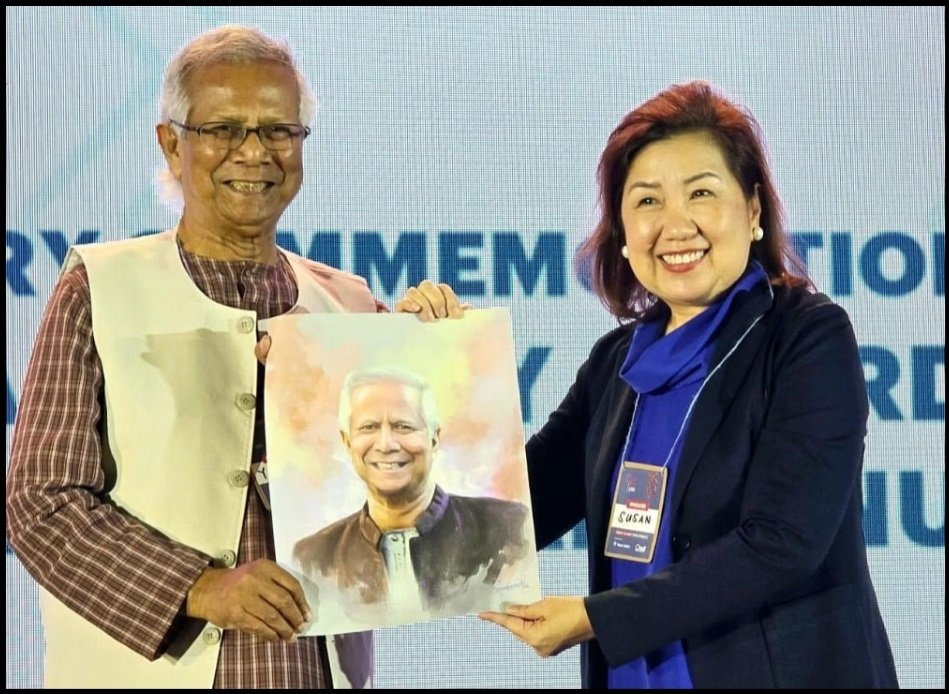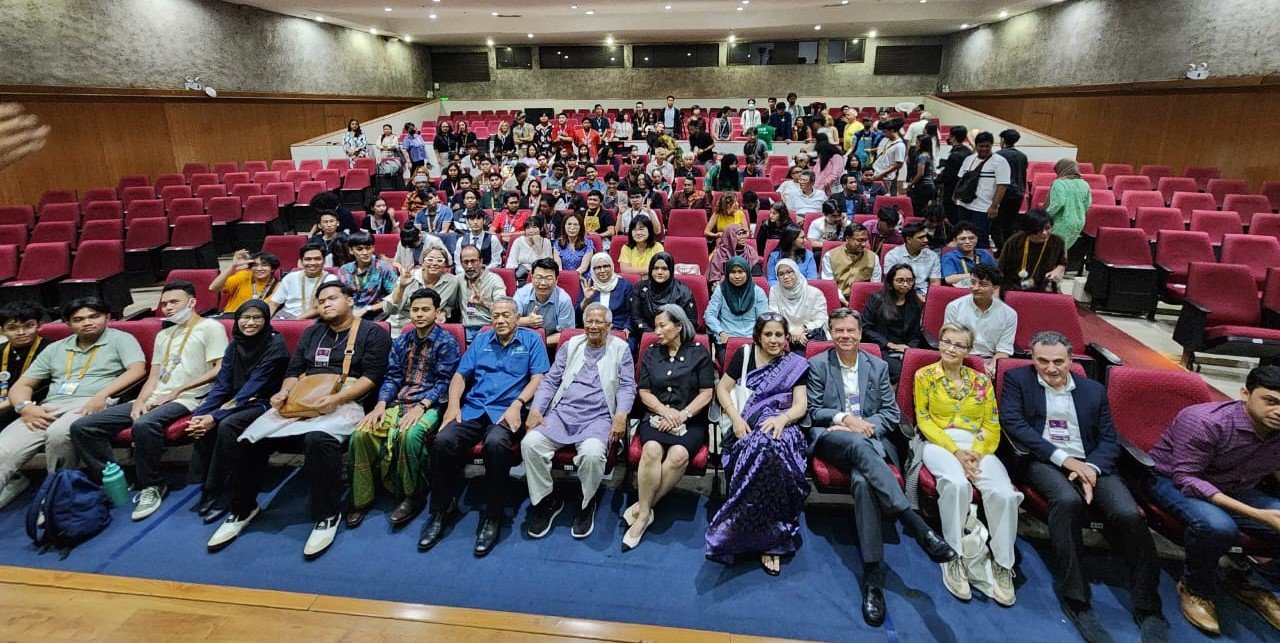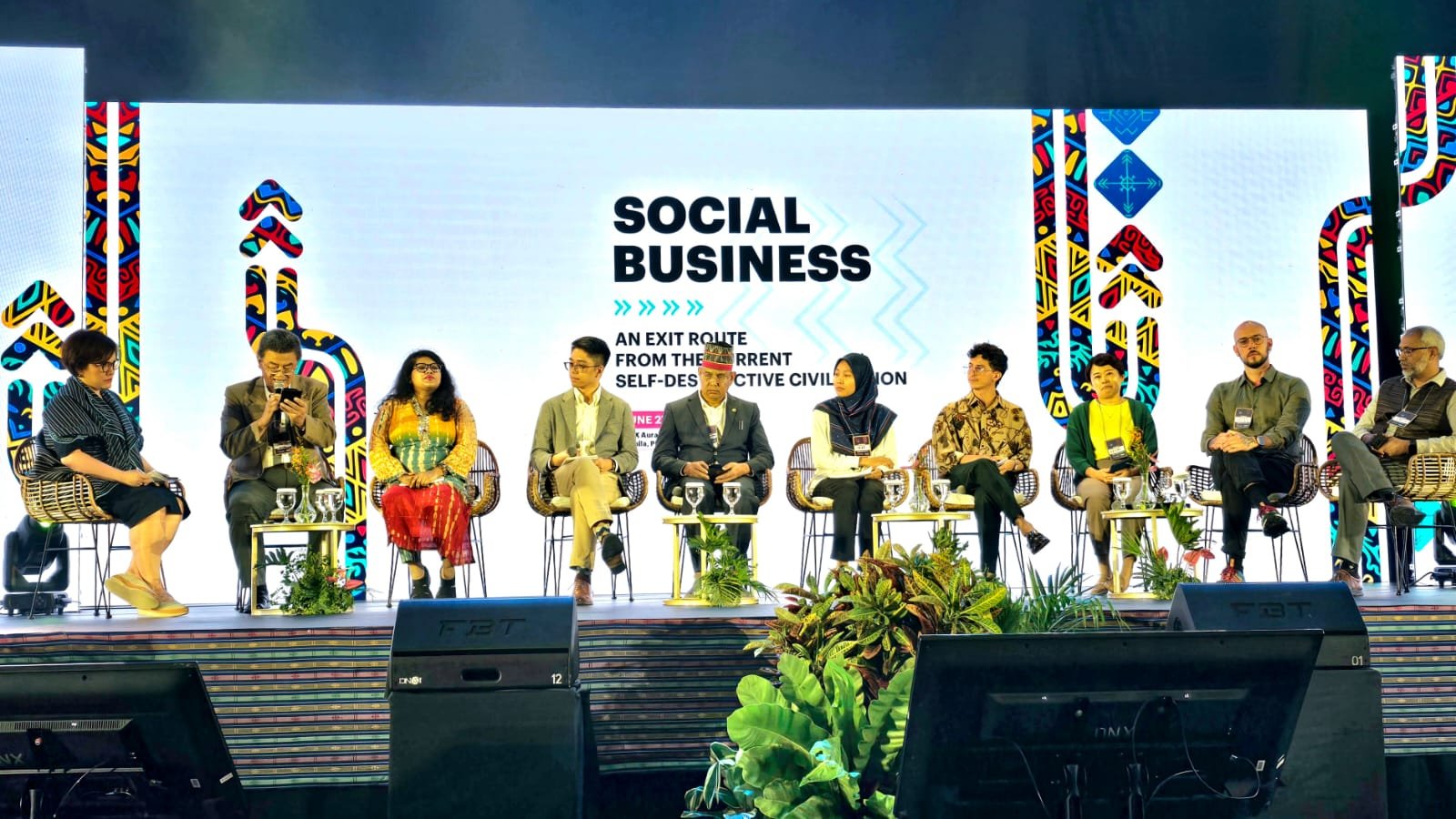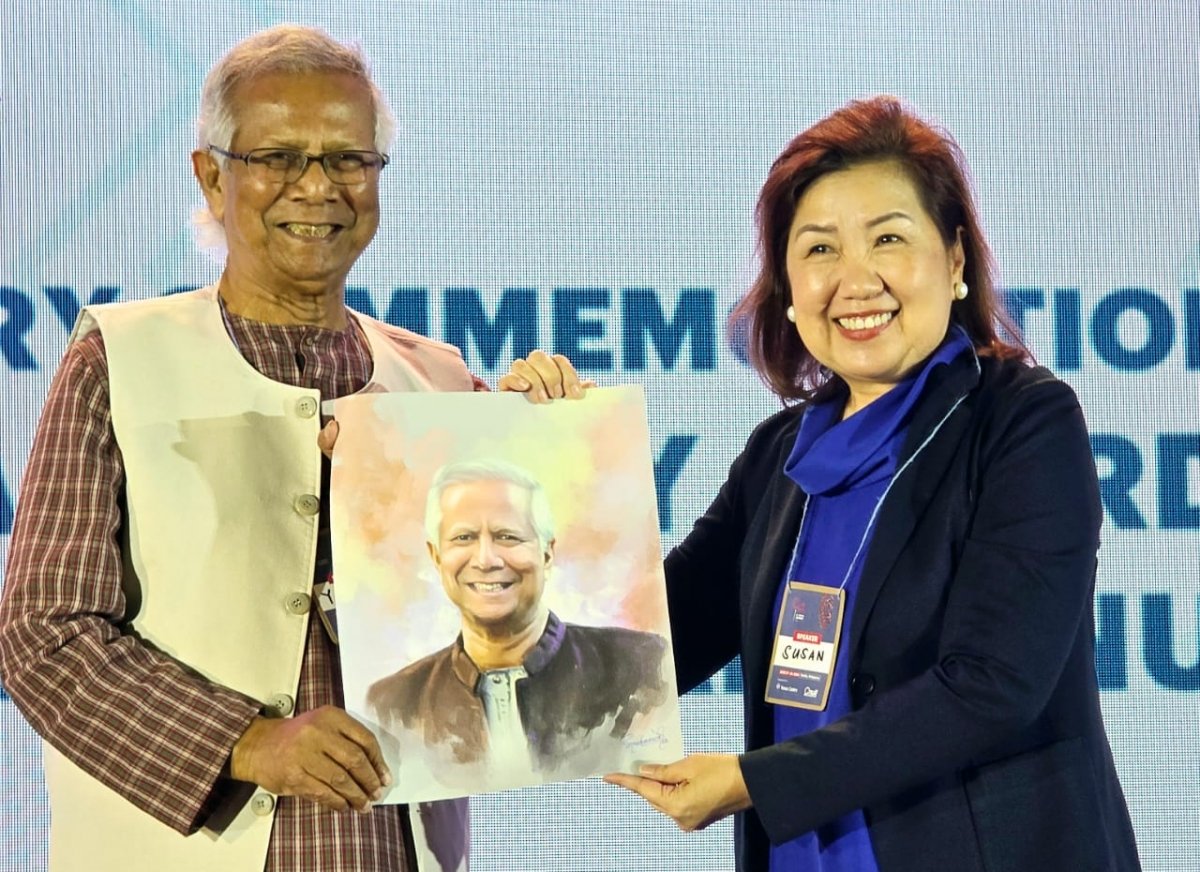“Why Should I Go to Jail? I Haven’t Committed Any Crime”: Yunus
“Why Should I Go to Jail? I Haven’t Committed Any Crime”: Yunus
Translation of the Interview with Nobel Laureate Professor Muhammad Yunus, published in The Bonik Barta on 05 June 2024 (https://bonikbarta.net/home/news_description/386424/)
Dr. Yunus gave a wide-ranging interview to the Bonik Barta that was published on June 5, 2024. Below, an English translation of the interview is provided in full. This represents one of the most complete statements by Professor Yunus about his state of mind during this extended period of unjust persecution, and has some interesting historical elements to it dating back to the Bangladesh war of independence and his role in the liberation struggle from his base (at the time) in the United States.
Dr. Muhammad Yunus is the founder of the microcredit institution Grameen Bank and the only Bangladeshi citizen to win the Nobel Peace Prize in 2006. He was awarded the highest civilian honor in the United States, the Congressional Gold Medal, back in 2013. He is one of only seven people in the world to have won these three prestigious awards: Nobel Peace Prize, the US Presidential Medal of Freedom (2009), and the Congressional Gold Medal. The ‘Paris 2024 Olympic Village’ was built at a cost of 400 million euros based on Dr. Yunus’s philosophy, and he is an advisor and goodwill ambassador to the Olympics. He is admired around the world for his contributions in alleviating poverty and empowering women. However, he is facing over a hundred cases in court on charges of corruption and labor rights violations in his country. In a recent exclusive interview with Bonik Barta, he spoke on such a variety of issues.
Your name has been in the headlines of the media around the world lately. Due to a number of allegations , you are being dragged to court, facing punishment. At your age, are these events collapsing your spirits?
More than damaging my spirits, they are disrupting my work. The work I wanted to do, and the work I had started long back, and now came to maturity and full speed, instead it has come to a complete halt. This is tragic. Forcing me to jail means stopping all my initiatives. To me it equals to death. Why should I go to jail? I haven’t committed any crime! Why I do I have to stop my work?
When you founded Grameen Bank and Grameen Telecom, the government cooperated with you. Even now, you have been taking various initiatives. Are you getting cooperation from the government at present? If not, why?
Question of co-operation disappeared long back. We are not being able to move forward with the initiatives we had prepared for over a long period. Now, I’m afraid that everything I have built will be lost! There is a lot of hard work involved behind everything we did; it was not easy to build these things. Seeing them fall apart is the biggest shock to me and my colleagues, who already got jail sentence along with me.
There has been pressure on Bangladesh’s democracy and human rights from the West for many years. After the elections, a high-ranking US official came here. It was said that they want to rebuild the relationship this time. Do you think that the pressure has eased somewhat now, or are they taking a go-slow approach on Bangladesh’s democracy and human rights?
What the West wants is not a major consideration for me. The things to consider is whether we want democracy, human rights and the freedom of the press, or not. If they want what we want, then that’s a matter of joy. I don’t see why they would want anything different.
You were in the United States during the 1971 Liberation War. You came back to the country after independence. How far has Bangladesh progressed in nation-building in the last 50 years? Where are the problems located now?
I was then in Nashville, Tennessee. I was teaching at Middle Tennessee State University from 1969 to 1971. During this time, I was keeping up with what was happening in the country. There were six of us Bengalis there together. We got the news that Bangladesh had declared independence. Immediately, the six of us assembled for a discussion. After a quick discussion, we formed the Bangladesh Citizens Committee and informed all the television stations in Nashville about our decision to change our citizenship. They invited us for interviews. We featured in their evening news. . This was our first initiative.
Then we formed a fund to continue this work and decided that everyone would deposit a fixed amount of monthly contribution . Two days later, I went to Washington DC to join other Bangladeshis, and build public opinion in favor of Bangladesh. All the Bengalis residing in the USA were supposed to meet in Washington. Enayet Karim was then the Deputy Ambassador of Pakistan to the United States. Three of us had taken residence in his house. We started working for Bangladesh from there. Within a few days, two organizations were formed, in the USA, one was New York-based, called the Bangladesh League of America and another was the Chicago-based named the Bangladesh Defense League.
Who were the main people behind these two organizations?
The world-renowned Bangladeshi-American architect and engineer Fazlur Rahman Khan (FR Khan) was the founder of the Bangladesh Defense League. We were in touch with both organizations. A newsletter was published under the editorship of Professor Shamsul Bari on behalf of the Bangladesh Defense League. We were very happy to receive the newsletter. I was invited to the Chicago conference and I went there. A lot of discussion took place there regarding supporting the emerging liberation war. The Bangladesh Defense League entrusted me with the responsibility of publishing their newsletter. I put all my attention on the newsletter. I published it regularly from my apartment in Nashville until Bangldesh was liberated. Last issue of the Newsletter was published in January 1972.
In addition to publishing the Newsletter I also took responsibility of managing the Bangladesh Information Centre, in Washing DC. Media and the people in the USA did not know what was happening in Bangladesh, or why it is happening.. Bangladesh Information Centre was created to provide information and mobilise support for Bangladesh liberation war. And lobby at the Senate and the House.
Besides news from the war front and the lobbying efforts of Bangladeshi groups in the UK and North America, I would publish a cartoon, drawn by me, in each issue of the newsletter. Later on all the issues of the Bangladesh Newsletter was compiled in a volume, and published by the Liberation War Museum in Dhaka. Professor Shamsul Bari and I wrote the Introduction and Foreward for the volume.
When Bangladesh won the liberation war, I told the Vice Chancellor of my university, MTSU, that I would go back to Bangladesh, and I would continue with university any more. I resigned and returned to Bangladesh in June 1972.
When you returned, it was a war-torn country. All around there were problems, lack of resources. You had a noble dream of changing Bangladesh. Fifty years later, how much of the Bangladesh you envisioned has been fulfilled?
At the time independence, Bangladesh was known as the poorest country in the world. About 86 percent of the people lived below the poverty line. Economic situation continued to deteriorate. Worst point was reached when we ended up with a famine in 1974. But it emerged out of the crisis with many simultaneous initiatives and changes in country.
Ordinary people came to play a very active role. The Bangladeshi people were basically micro farmers , mostly sharecroppers, tilling land owned by a few well-off people. Their only ambition was to grow enough rice for the family. They never left their homes and villages in their life time. After independence something dramatic happened. They started leaving for the Middle East for jobs and cash income. Remote villages got connected with modern cities. Farmers started earning foreign exchange and sending home.
The second change after independence came among the educated youth. Before independence, Pakistani investors came created businesses. The economy was under their total control. Bengali educated youth traditionally formed a class of clerks mostly in government offices.
Suddenly a change began to take place among the youth. To take advantage of global quota system Chinese and Korean garment manufacturers started producing garments in Bangladesh. They hired Bangladeshi young people as clerks and facilitators. They learned the business quickly. Clerks started trying their hands in industrial production. A new class of young industrialists emerged out of nowhere. This industry changed Bangladesh in more ways than just creating an entrepreneurial class for the first time in history.
Women started to work in these factories in a massive number defying the age-old social and religious norms. Women were living in cities away from families, women sendin. money home to husbands at home turned around the society.
How would you assess the role of various NGOs in the Post-independence era?
In the aftermath of independence, non-governmental organizations (NGOs) initiated a wide range of activities in Bangladesh. Their presence became ubiquitous all over the country. NGOs expanded nationwide. Besides income generating programmes they paid attention to health issues. The country was helpless in face cholera outbreaks. Death from cholera was un stoppable. If it starts in one village, it will spread in a long series of villages. Surrounding villages will become empty of people to escape from cholera.
The International Centre for Diarrheal Disease Research, Bangladesh (ICDDR, B), developed a salt-water-molasses solution as medication to fight cholera, which can be easily prepared at home. People got cured from drinking this. NGOs helped people to learn the formula to protect themselves from cholera.
Most powerful change was brought by Grameen Bank. It created a completely new banking for the poorest, particularly for poor women. No one ever heard before that the bank would give loans to the poor women of the village. That too without collateral. At first, it seemed it is not going work. But it worked. While some appreciated this initiative, others approached it with skepticism. Grameen Bank spread quickly rom village to village. Grameen Bank not only gave loans to women, but also made them the owners of the bank. Soon 10 million women became owners of the largest bank in the country. Poor women skipped waiting for humiliating jobs, became entrepreneurs instead.
Traditionally the villages of Bangladesh, there were no toilets for the rich or the poor. They were not accustomed to using the toilet. People responded to the call of nature behind the bushes. Grameen Bank made it their cause. It encouraged people to install latrines manufactured and delivered by a Grameen Bank. The bank gave loans to set up latrines.
Then Grameen Bank moved to housing loans. Back in the day, when girls were about to be married, it involved the question: how is the (groom’s) house? At that time, houses with tin roofs were extremely rare. Most people’s houses had roofs and walls made of bamboo and straw. Neither of these houses could keep out the rain nor the sun. Grameen Bank began offering housing loans to transform these bamboo and straw houses of the poor into tin-roofed homes.
While working with women, Grameen Bank encountered a problem—which was divorce. Grameen Bank came out with a policy of its own to reduce divorce. Grameen Bank announced a policy for housing loans. To receive a housing loan, women had to be the owners of the land. The women said they lived in their husband’s house and did not own any land. Grameen Bank then said, tell your husbands to transfer the land to your name, and then we will give you the loan. Since the husbands were interested in having a tin-roofed house, they reluctantly transferred the land under their wives’ names. Grameen Bank provided loans only to those whose land was transferred. Wherever Grameen Bank provided housing loans the question of divorce did not arise.
If the issue of divorce ever came up, the wife then could remind the husband about the ownership of the house, saying, if you divorce me, you are one who has to leave the house. The right to own your house has been a tremendous security and self-respect for women.
The garment industry was established, Grameen Bank was founded, and people began going abroad—a massive change happened in Bangladesh.. The image of the traditional petty farmer, or the Bengali the clerk, women hiding all her life in back room —changed.
One finds it difficult to imagine the dramatic change that has taken place in Bangladesh in 50 years.
Fifty years ago, South Korea’s situation was not much different from Bangladesh. It went through political crises and military rule. However, it emerged as an industrial giant through investment in education and health. What did we miss that prevented us from achieving such progress?
Many changes could have been brought about in our country. However, the change that has taken place is significant. Now, the foundation has been laid at least. We can go a long way based on this foundation. If you look at Malaysia, you will see that the native Malays were extremely poor farmers. Although the Malays were native of the soil, the Chinese held all the money. But by providing various opportunities and educational facilities to these owners of the soil, they have reached a stage where they can now govern the country. In all the areas, their position has been established. Dramatic changes have occurred in Malaysia due to their politics. By focusing on education, financial structure, and health, we too can write these chapters of success.
You established the Grameen Bank to empower the poor people of Bangladesh. Now you are over eighty years old. At this age, are you thinking of doing something new for the empowerment of the poor?
I am doing everything that is possible for me. From solving banking sector problems to introducing the concept of social business, I am encouraging the youth to become entrepreneurs. I talk about building a world of three zeros. I point out that our current civilization is a suicidal one. It is leading us to our extinction. We have to build a new civilization, a world which will be of three zeros—zero carbon emissions, zero wealth concentration, and zero unemployment. I encourage the youth to establish three -zero clubs with five members. I advise them to work towards fulfilling the three-zero goals and reflect it in their own lives. Because it’s not enough to just tell others; one must first become the change himself/herself. That means I will not do anything that increases global warming, pollution, or concentration of wealth.
In Bangladesh, there has been a stupendous centralization of wealth in the name of development. Economists and policymakers in the country have all said that this will be a huge problem for the future of Bangladesh. What is your opinion on this matter?
The problem of wealth centralization exists all over the world. However, in Bangladesh, it is happening especially in the name of development. Now development means money going into the hands of the rich. As a result, the rich continue to become powerful and wealthy. The powerful hold political power. This process is embedded in the existing economic framework. So, without changing the conceptual economic framework , we cannot escape this situation. We cannot expect to get coconut if we plant a mango tree. Therefore, we have to work on redesigning the framework. Plant a coconut to get coconut from the tree. The concept of social business can bring this structural change. We have to do business that solves social and economic problems, not just business for profit-making.
A total of 109 Yunus Social business centers have been established in 39 countries around the world. Just as we have created a wrong world through wrong education, we must now find the right education to create the right world.
You are getting opportunities to work in various countries, is the scenario same for Bangladesh? Am I even finding opportunities in Bangladesh?
I am being attacked from all sides. I am spending time going from door to door at the courts. No opportunity is arising for working for the future. If I find some opportunity in between, I do it. But then suddenly another terrible attack begins. Very unfortunate.
End
Related
15th Social Business Day 2025 to be held on June 27–28
Statement from Professor Muhammad Yunus:
দেশবাসীর উদ্দেশ্যে প্রফেসর ইউনূসের বক্তব্য
Prof. Muhammad Yunus felicitated in Manila on the occasion of his 40th anniversary of receiving the “Ramon Magsaysay” Award.

“র্যামন ম্যাগসাইসাই” পুরস্কার প্রাপ্তির ৪০তম বার্ষিকী উপলক্ষে প্রফেসর মুহাম্মদ ইউনূসকে ম্যানিলায় সম্মাননা প্রদান

Social Business Academia Dialogue & 3ZERO Club Convention 2024 held in Manila, Philippines

The 14th Social Business Day concludes in Manila, Philippines

The 14th Social Business Day 2024 kicks off in Manila, Philippines



